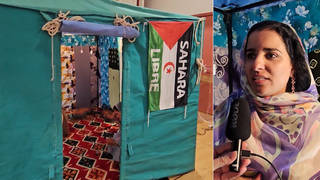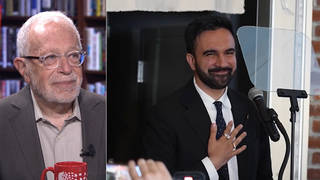
The United Nations General Assembly Special Session on AIDS opened on Wednesday. Protesters gathered outside the UN building in New York City to calling on world leaders to fulfill their commitments to fighting AIDS and accused the Bush administration of undermining the international drive against the disease in its global AIDS policy. We speak with David Bryden of the Global AIDS Alliance. [includes rush transcript]
The United Nations General Assembly Special Session on AIDS opened Wednesday in New York City. The meeting is one of the biggest since the UN set out goals for tackling the virus in 2001. In total 180 governments will be represented at the three-day conference which is due to end with a new declaration setting out changes in strategy for the global drive against AIDS over the next nine years.
At the opening of the session, UN General Secretary Kofi Annan said the vast majority of countries had fallen “distressingly” short of meeting their targets and criticized the lack of progress in combating HIV.
- Kofi Annan, UN General Secretary, speaking May 31, 2006.
Next week marks the 25th anniversary of the first documented case of AIDS. On Tuesday, UNAIDS officials announced that the total number of HIV cases worldwide has topped 38 million but that the epidemic has begun to slow. India now has the largest number of people infected with HIV, but the worst hit region remains sub-Saharan Africa. Last year 4.1 million people became infected with HIV. An estimated 2.8 million people infected with HIV died last year.
Protesters gathered outside the UN building in New York yesterday to demand that the leaders of rich countries and the most affected countries listen to people most directly affected by HIV and fulfill their commitments to fighting AIDS. The protesters chained themselves in the lobby of the US mission around a large poster that featured a blowup of a letter addressed to Ambassador John Bolton. Police used bolt cutters to separate them and made at least 21 arrests.
The AIDS activists have accused the Bush administration of watering down a declaration to be debated at the conference by removing treatment targets and references to prevention measures–such as condoms and sterile injecting equipment–in favor of abstinence.
Criticism also came from an unlikely source–President Bush’s former AIDS policy director. Scott Everts was Bush’s lead negotiator at the global conference on AIDS five years ago. He told Reuters that the Bush administration has reached out to militant Islamic governments, including some it classifies as terrorist states, to try to ensure the 2006 declaration backs abstinence and fidelity as crucial tools against AIDS.
- David Bryden, Communication Director for the Global AIDS Alliance.
Transcript
JUAN GONZALEZ: At the opening session, the U.N. Secretary-General Kofi Annan said the vast majority of countries had fallen “distressingly short of meeting their targets” and criticized the lack of progress in combating HIV.
KOFI ANNAN: We need to be able to protect the most vulnerable. And if we are here to try and end the epidemic and fight the epidemic, we will not succeed by putting our head in the sand and pretending that these people do not exist or they do not need help. We need to help them, and we need to resist any attempt to prevent us from recognizing the need for action and assistance to these people. And I will say publicly, we should all challenge the government’s concern to be realistic and responsible.
JUAN GONZALEZ: Next week marks the 25th anniversary of the first documented case of AIDS. On Tuesday, UNAIDS officials announced that the total number of HIV cases worldwide has topped 38 million, but that the epidemic has begun to slow. India now has the largest number of people infected with HIV, but the worst hit region remains sub-Saharan Africa. Last year 4.1 million people became infected with HIV. An estimated 2.8 million infected with HIV died last year.
AMY GOODMAN: Protesters gathered outside the U.N. building in New York to demand the leaders of rich countries and the most effected countries listen to people most directly affected by HIV and fulfill their commitments to fighting AIDS. The protesters chained themselves in the lobby of the U.S. mission around a large poster that featured a blowup of a letter addressed to Ambassador John Bolton. Police used bolt cutters to separate them and made at least 21 arrests.
The AIDS activists have accused the Bush administration of watering down a declaration to be debated at the conference by removing treatment targets and references to prevention measures, such as condoms and sterile injecting equipment, in favor of abstinence.
Criticism also came from an unlikely source: President Bush’s former AIDS policy director. Scott Everts was Bush’s lead negotiator at the global conference on AIDS five years ago. He told Reuters the Bush administration has reached out to militant Islamic governments, including some it classifies as terrorist states, to try to ensure the 2006 declaration backs abstinence and fidelity as crucial tools against AIDS.
We’re joined right now by David Bryden, Communications Director for the Global AIDS Alliance. We welcome you to Democracy Now!
DAVID BRYDEN: Good to be here.
AMY GOODMAN: It’s good to have you with us. Your assessment of the Bush administration at this point’s policy on AIDS in this country and around the world, on dealing with it, and this former AIDS policy director criticizing him, Bush’s former policy director?
DAVID BRYDEN: Yeah, it’s an interesting development. Scott Everts, the former AIDS coordinator is now being quite critical, and it does show that there are Republicans we can’t paint with too broad a brush on this. There are Republicans who really quite sincerely want to see progress on this issue, including members of Congress. So, in terms of how could we assess where we’re at with this crisis, what we have seen is greater leadership in terms of providing resources. We’re seeing greater leadership from some African governments, some Asian governments, particularly Thailand, Cambodia. We’re seeing falling infections in a number of countries. But we’re still falling far short in terms of the resources that are needed to fight this epidemic and actually get ahead of the crisis, because the test really of U.S. leadership and even global leadership is not how well are we doing in ameliorating the problem, but really getting ahead of it and dealing with its effects before it keeps on expanding to other regions.
JUAN GONZALEZ: And what about the Bush administration’s role in the discussions and the talks? Several years ago in the President’s State of the Union, he made a big push on the issue of combating AIDS. What’s been the actual result?
DAVID BRYDEN: Well, President Bush promised to spend $15 billion over five years. Now, part of that was to be spent on TB and malaria and part of it on HIV/AIDS research, as well. But in terms of actually providing the money, the President has actually proceeded, and Congress has come forward. Fortunately, Congress has ameliorated the most unilateral aspects of the President’s plan, and that’s been an essential problem with the President’s approach, in how he’s approached AIDS and really undermined its effectiveness.
But, you know, in terms of U.S. leadership, the United States likes to describe its approach as one based on partnership, as one really informed and led by what it’s hearing from its African “partners.” In fact, the United States is contradicting what African governments are wanting in a number of key areas. Number one, in it terms of the amount of money that’s needed, particularly for the Global Fund, which is a multilateral approach to fighting HIV/AIDS. It’s cost-effective, and the leverage has more support from nations around the world, so that when the U.S. gives a dollar, other nations give $2. So it’s a way of actually leveraging greater leadership on this issue. African governments have requested the U.S. fully support the Global Fund. The United States has failed to do that.
Also in areas of prevention, particularly sexual prevention, African leaders are now on the record saying, “We want to see comprehensive sexual prevention. We don’t want to see just abstinence-only until marriage programs. We want to see a full range of programs that are available, including to young people, who really deserve to be taken seriously and respected on this issue, and their viewpoints, and we need to get the information that they deserve.” So in a couple of areas, we’re really contradicting key commitments that the United States has made.
You know, last year at the G8 summit, the President committed to achieving universal access to HIV/AIDS treatment. We’re not going to reach that goal by 2010, which is the date that they set, unless we fully support the Global Fund, unless the United States gets serious also about investing in health workers. The United States right now is actually importing nurses from Africa. We have 16,000 nurses from Africa working in the United States, and the U.S. has policies in place which really constitute a magnet, drawing nurses and other healthcare personnel from Africa and other affected regions. And this is not to criticize people for making the immigration choices they make and freedom of movement, but it’s really that the United States needs to do much more to make sure that African workforce is fully supported. And that comes back to IMF loan conditions, for instance, and other policies that make it harder for countries to raise salaries and retain health workers, because that’s been one of the crucial bottlenecks, actually, in terms addressing HIV/AIDS, is lack of personnel.
JUAN GONZALEZ: Well, how do those IMF loan conditions affect the battle against AIDS?
DAVID BRYDEN: Well, when countries are — there are conditions that countries have to adhere to in receiving loans from the International Monetary Fund and from the World Bank. Some of those include inflation targets, that they have to adhere to really quite draconian inflation targets, much lower inflation targets than what most economists would say is actually necessary. That leads to countries imposing budget ceilings. So, for instance, the health budget cannot exceed a certain level, according to IMF conditions. What that means is that it’s difficult to raise salaries of workers so that they actually stay in the country.
And there are other issues, too, why workers choose to go in search of employment abroad, and it’s not just the United States, but they also leave to go to Britain and other countries. But it’s still a major factor. And there are a lot of things the United States could do to really invest in community health workers, in health workers across the board, because that’s a major problem in terms of addressing the crisis.
AMY GOODMAN: David Bryden is with Global AIDS Alliance. Your assessment of the UNAIDS report saying that AIDS is beginning to slow?
DAVID BRYDEN: Well, it’s a bit of a too broad of a characterization of what’s actually happening. And I think the head of UNAIDS actually corrected himself to some extent, in saying that it’s expanding in a number of areas, in fact. If you look at a couple of key places, particularly if you look at new infections among young people in urban areas in sub-Saharan Africa, there is a decline in prevalence in those areas, in those urban areas in capital cities. And that’s a positive thing. We’re starting to see young people reducing the number of sexual partners. We’re seeing young people using more condoms, and across the board more condom use in a number of countries. So there’s no question, there’s progress, and when we invest money wisely, we can see progress. And that’s important to note, that this is not something that cannot be tackled. This problem is not too big for the world to actually address. And we must address it practically.
But it’s clear that in a number of countries it’s actually expanding. Indonesia is one. There are a number of others: Bangladesh, Pakistan. There are a number of other countries where it’s clearly expanding. So I think that —
AMY GOODMAN: AIDS.
DAVID BRYDEN: Yes. No question. HIV/AIDS is expanding.
AMY GOODMAN: The Bush administration says it’s the largest contributor to the Global AIDS Fund.
DAVID BRYDEN: Well, when it comes to the Global Fund, the United States is the largest single nation contributor. If we look at Europe, the European Commission, Europe as a whole is now one entity. Europe is actually the largest contributor when you look at it through that lens. The other important thing to recognize about how the Bush administration characterizes this is that if it got its way, the United States would not be the largest contributor. It’s only because Congress stepped in and said, “No, we don’t agree with your unilateral approach to HIV/AIDS.” And this includes a number of Republican members of the Congress who said, “Actually, we need to make sure that the Global Fund gets more money.”
In terms of the global fight against AIDS, it’s true that the United States is contributing the largest single share. But we have to also look at how much of that is spent on expensive consultants, how much of that has to be spent on brand name pharmaceuticals. There are a number of issues there, but the real question is: what would it be like if the United States actually took this issue so seriously that it invested the kind of diplomatic resources to get the full amount that’s needed to tackle this crisis? That’s the level of leadership we need to see.
JUAN GONZALEZ: What about India? The report now is that India has the largest number of cases. How is the Indian government — given the continuing brain drain that occurs in India in terms of people, educated professionals, doctors and others leaving the country, how is that government coping with the crisis?
DAVID BRYDEN: It’s a really good question, because we have to focus accountability not just on the United States. I mean, India has really fallen down on the job. If you look at the number of people, the percentage of people actually receiving treatment in sub-Saharan Africa versus India, it’s actually higher in Africa, even though they are much poorer, economically speaking. We’re still seeing less than 10% of the people in India who need treatment actually getting it. And it’s a tiny percentage of children, actually. And that’s true globally.
JUAN GONZALEZ: Why is that?
DAVID BRYDEN: The Indian government has just been very slow to respond. I think there’s a lot of stigma. There was a lot of denial, particularly early on, in India. The government simply hasn’t prioritized delivering these kinds of services, particularly when they affect the most marginalized sectors of the society that the largest side doesn’t want to admit exist. We’re talking about sex workers. We’re talking about injecting drug users. And these are vulnerable populations that have to be explicitly named. That’s one of the issues that the U.N. is grappling with.
AMY GOODMAN: David Bryden, I want to thank you for being with us, Communications Director for the Global AIDS Alliance.













Media Options